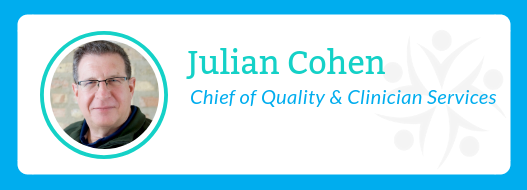
With a career in behavioral health spanning more than three decades, Julian Cohen has been instrumental in shaping the way communities throughout the U.S. access mental health treatment. Before joining Regroup in February this year, Cohen most recently served as president of Teladoc Behavioral Health and, prior to that, CEO of Breakthrough Behavioral.
Here, Cohen talks about how Regroup works closely with healthcare organizations and telepsychiatrists to improve access and care through strong partner, provider and patient relationships.
1. You have extensive experience in the healthcare and telepsychiatry space. What prompted your decision to join Regroup?
Over the last 10 years or so, one of the big issues I’ve had the opportunity to look at is the use of technology to improve mental health care access. We’re facing huge shortages of providers, and accessing care is difficult for many rural as well as urban residents. When I left Teladoc Behavioral Health, I wanted a role where I could have the greatest impact to keep that access concept going. Regroup’s integrated approach, where we partner with healthcare facilities to provide services to patients, lets us offer a larger scope of service and a larger scope of medications. Regroup’s mission to improve care access really influenced my decision.
2. Of all you’ve learned throughout your career, what has most influenced your work at Regroup?
The best way to provide access and treatment successfully to patients is to have a culture where the clinicians feel valued as Regroup employees, and healthcare organizations feel that we are their partner. Regroup is focused on cultivating relationships where partners see Regroup and our clinicians as expert resources to help support their needs. I want to continue building a system and platform that is easy for the provider and partner to engage in, without creating dramatic changes to their workflows.
3. What are your daily responsibilities, and how do they inform your overarching goals for Regroup?
A lot of my focus is on our clinicians and our partners, including account management, clinician services, recruiting and licensing and credentialing, as well as looking at overall quality.
My top goal is to provide a really good provider match to the partner. We’re focused on asking the right questions of our partners, so we can understand their needs and find the right telepsychiatrist for them. We’re also focused on measuring the quality of those services by making the best use of analytics. Finally, we want to keep finding opportunities to improve efficiency. Processes like credentialing can take many months. The faster we can do them, the faster we can begin supporting our partners.
4. What differentiates a Regroup clinician from other teleclinicians?
Our providers have a very mission-based approach to their work. Many are early in their careers and very interested in telepsych. They want to work within shortage areas and have an opportunity to work with patients that they likely wouldn’t serve otherwise, But on the other end of the spectrum, we have providers who are looking to wind down. They don’t want to retire, but they don’t want to run a business. Regroup takes all that responsibility off the providers so they don’t have to worry about collections or new patients coming in. They can focus on providing treatment to those who otherwise would not have access to it.
5. What unique opportunities does practicing telehealth at Regroup present to a clinician?
Our goal is to actually employ the provider. By doing that, we’re giving them the opportunity to create stable relationships with our partners, which provides continuity of care for patients while also benefiting our clinicians. There’s a lifestyle aspect to it, too. Most of our providers are working from home, which allows them to plan their life around their career. We’re seeing a big number of female providers with young children come to work at Regroup because of the freedom it provides.
6. What’s the most fulfilling part of your work at Regroup?
I’ve been a big promoter of technology in behavioral health. I think we do a great job of finding new ways to use technology. We have plans to expand it more and more, and taking advantage of those opportunities will help improve efficiency and give the patient more choice in the kinds of services that are available to them. So, the most fulfilling part is working toward the mission – providing access to care. In all my time in behavioral health, we’ve always talked about lack of access to services. Knowing that we are providing services to folks who would be struggling to find those services otherwise is extremely fulfilling.
.png?width=170&height=100&name=Array_rgb%20(1).png)